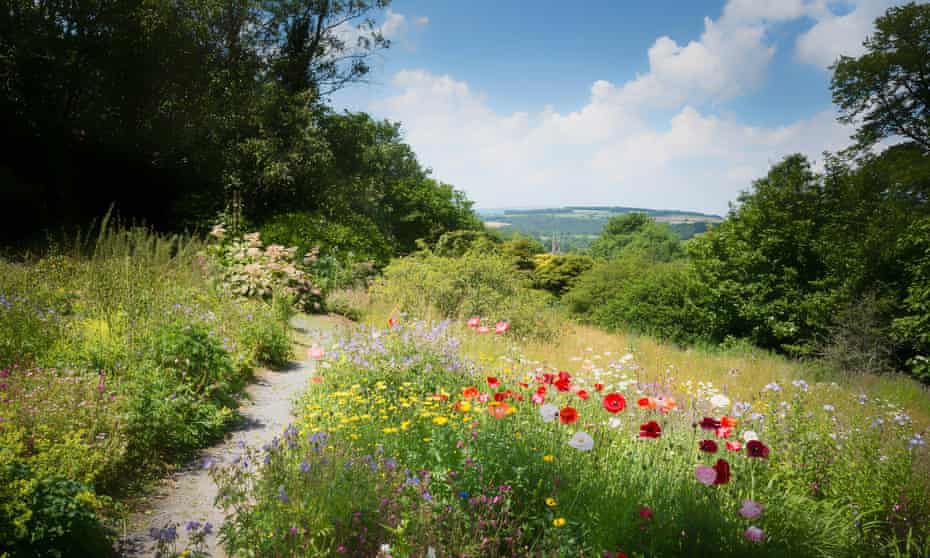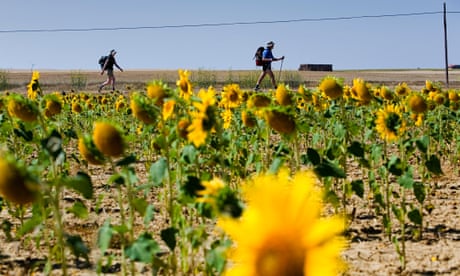
The gates to the garden of nature writing are being prised open by a new generation of talent. Photograph: Garfotos/Alamy
From This Land Is Our Land to Why Rebel, the message is that if we take heed of the natural world, we can heal ourselves
Nick Hayes
Mon 19 Jul 2021 1
English nature writing can be a bit polite. Decorating nature with adjectives has become something of a fashion in the last decade, but there are some books whose verve is a wildflower seed bomb to the neat lawns of English prose.
Principal among these are any of the books written by the magus of human experience in the wild, Jay Griffiths. From Wild, to Kith, to Why Rebel, her latest collection of essays, there is an energy in her words that feels like being chased by wolves. Best of them all is Tristimania: A Diary of Manic Depression, which describes with hyperreal force the electrical storms of the mind, the eerie twilight of mania.

Jay Griffiths: ‘I walked 800km in a heatwave to get out of a severe depression’
There are many books that shine a light on the otherwise unmentioned elephant in the room of writing about English nature: that we are allowed access to so little of it. Andro Linklater’s Owning the Earth deals with the issue on a global level, and Guy Shrubsole’s excellent Who Owns England? focuses on this country. Ask any land rights campaigner, and the book that inspired them was Marion Shoard’s This Land Is Our Land. Shoard worked for several years for CPRE, the countryside charity, and was fully integrated into the system of land ownership in England and yet, or thus, wrote three excoriating books about its iniquities: The Theft of the Countryside, Right to Roam, and This Land Is Our Land. The last is a comprehensive history of how we lost our rights to land, from William the Conqueror to the modern day.
At long last, the gates to the English garden of nature writing are being prised open by a new generation of talent from communities previously marginalised from both the countryside and the publishing industry. Jini Reddy’s Wanderland deals with the sense of feeling unwelcome in a predominantly white landscape. It primarily seeks a connection of magic between the human and non-human, something deeper than our obsession with leisure and recreation.
The book that most informs the dynamic of race in the English countryside for me is Capitalism and Slavery by Eric Williams. It is a detailed account of the horror at the heart of racism, how it was used to justify the profiteering of sugar barons. It hammers home the point that by objectifying and commodifying nature, we do the same to each other.
Rob Cowen’s recent collection of poems focuses on our recent year of lockdown, emphasising how desperately we need to connect with nature. Mixing the deeply personal with policy and propaganda, interweaving the callous coldness of the wild, from sparrowhawks to viruses, with the regenerative and ebullient effects of nature, The Heeding reminds us what, with a thousand years of exclusion, most of us had forgotten until lockdown: take heed of nature, and we can heal ourselves.
The Book of Trespass: Crossing the Lines that Divide Us by Nick Hayes is published by Bloomsbury (£9.99). To support the Guardian and the Observer buy a copy at guardianbookshop.com. Delivery charges may apply.
From This Land Is Our Land to Why Rebel, the message is that if we take heed of the natural world, we can heal ourselves
Nick Hayes
Mon 19 Jul 2021 1
English nature writing can be a bit polite. Decorating nature with adjectives has become something of a fashion in the last decade, but there are some books whose verve is a wildflower seed bomb to the neat lawns of English prose.
Principal among these are any of the books written by the magus of human experience in the wild, Jay Griffiths. From Wild, to Kith, to Why Rebel, her latest collection of essays, there is an energy in her words that feels like being chased by wolves. Best of them all is Tristimania: A Diary of Manic Depression, which describes with hyperreal force the electrical storms of the mind, the eerie twilight of mania.

Jay Griffiths: ‘I walked 800km in a heatwave to get out of a severe depression’
There are many books that shine a light on the otherwise unmentioned elephant in the room of writing about English nature: that we are allowed access to so little of it. Andro Linklater’s Owning the Earth deals with the issue on a global level, and Guy Shrubsole’s excellent Who Owns England? focuses on this country. Ask any land rights campaigner, and the book that inspired them was Marion Shoard’s This Land Is Our Land. Shoard worked for several years for CPRE, the countryside charity, and was fully integrated into the system of land ownership in England and yet, or thus, wrote three excoriating books about its iniquities: The Theft of the Countryside, Right to Roam, and This Land Is Our Land. The last is a comprehensive history of how we lost our rights to land, from William the Conqueror to the modern day.
At long last, the gates to the English garden of nature writing are being prised open by a new generation of talent from communities previously marginalised from both the countryside and the publishing industry. Jini Reddy’s Wanderland deals with the sense of feeling unwelcome in a predominantly white landscape. It primarily seeks a connection of magic between the human and non-human, something deeper than our obsession with leisure and recreation.
The book that most informs the dynamic of race in the English countryside for me is Capitalism and Slavery by Eric Williams. It is a detailed account of the horror at the heart of racism, how it was used to justify the profiteering of sugar barons. It hammers home the point that by objectifying and commodifying nature, we do the same to each other.
Rob Cowen’s recent collection of poems focuses on our recent year of lockdown, emphasising how desperately we need to connect with nature. Mixing the deeply personal with policy and propaganda, interweaving the callous coldness of the wild, from sparrowhawks to viruses, with the regenerative and ebullient effects of nature, The Heeding reminds us what, with a thousand years of exclusion, most of us had forgotten until lockdown: take heed of nature, and we can heal ourselves.
The Book of Trespass: Crossing the Lines that Divide Us by Nick Hayes is published by Bloomsbury (£9.99). To support the Guardian and the Observer buy a copy at guardianbookshop.com. Delivery charges may apply.
No comments:
Post a Comment